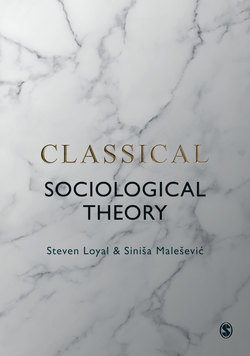Читать книгу Classical Sociological Theory - Sinisa Malesevic - Страница 12
На сайте Литреса книга снята с продажи.
I Plato and Aristotle
ОглавлениеIt may seem odd to begin a book on sociological theory as far back as ancient Greece, but what is distinctive about Western thought and rationality – the view that the world has fundamental properties and processes accessible to the human mind – finds its origins there (Rossides, 1998: 2). Given the limited development of the division of labour the Greeks did not comprehend society in a compartmentalised way as contemporary thinkers do. Although the word ‘sociology’ does not appear until the eighteenth century with Comte, the ancient Greeks provided a number of terms that we now take for granted and use in the social sciences and humanities generally. These include the word theory theóría (θεωρία), from the Greek contemplation, often contrasted with the word ‘practice’ (praxis, πρα∼ξις) – for doing. But other indispensable concepts including science, art, criticism – for judging, as in a court case, or at a theatrical performance – also derive from ancient Greece. In addition to his philosophy Plato was one of the first thinkers to reflect systematically upon political society or the polis, and on the idea of what a just society should look like. However, it was with Aristotle that a more general analysis of human association became possible especially through his discussion of koinonia, which simultaneously included the notions of association, community and society since these were not conceived as separate (Frisby and Sayer, 1986: 13–14).
However, language as a practice is always embedded in broader social practices and relations (Wittgenstein, 1968), and there were fundamental differences between the ancient Greek structure of language, thought and life and modern ways of thinking. The writings of Plato and Aristotle, two thinkers whose thought not only directly shaped subsequent philosophy, but also, indirectly, sociological thinking and theorising, are indeed deeply rooted in the social, political, economic and cultural context of their time. This shaped and served as a frame of reference for many of the questions they asked about the human condition, and their diagnoses of the problems they faced, through philosophy (philosophia, ϕιλοσοϕία), meaning ‘love of wisdom’, and the images and metaphors with which to think about humans and human societies.
